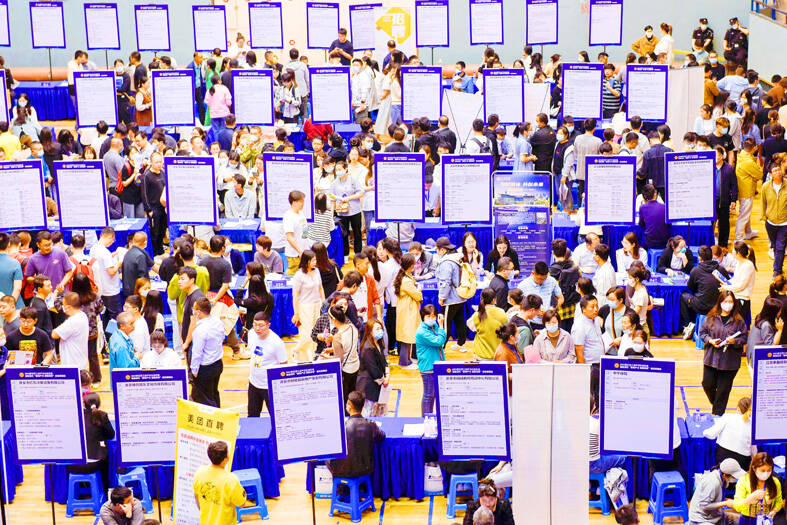The number of employment and entrepreneurship bases authorized by China’s Taiwan Affairs Office (TAO) has dropped by half and are unable to provide support to young Taiwanese, a government investigation has found.
The TAO in 2015 began establishing such bases to help young Taiwanese and Chinese seek employment or start their own businesses, the government investigation said.
The program is part of Beijing’s “united front” tactics targeting young Taiwanese, promising to provide thousands of employment and internship opportunities.

Photo: AFP
However, only 39 of the 78 bases are still in operation, organizing four events in the past three years, the investigation found.
The four events included a summit and an exchange event in Nanjing in 2020, as well as a training program and an entrepreneurship competition held last year in Nanjing and Shanghai respectively, it found.
Some bases are moving toward marketization, a Taiwanese who participated in these events said, and the opportunities for Taiwanese to start a business in China have been greatly reduced in recent years, the investigation said.
The bases in many provinces are unable to continue operating, resulting in many Taiwanese who tried to start a business in China failing or receiving no assistance, an official said on condition of anonymity.
The economic and political risks of starting businesses or getting jobs in China have also increased, the person said.
Due to China’s ailing economy, local young people are struggling to find jobs, he said, adding that unemployment is worse than the official data show.
Many young people are unwilling or afraid to spend money, choosing to stay at their family homes and relying on their parents, which has caused the economy to stagnate further and exacerbating social problems, the person said.
As foreign investors and Taiwanese businesspeople are planning to leave China under these circumstances, unemployment is expected to worsen, the person added.

Seventy percent of middle and elementary schools now conduct English classes entirely in English, the Ministry of Education said, as it encourages schools nationwide to adopt this practice Minister of Education (MOE) Cheng Ying-yao (鄭英耀) is scheduled to present a report on the government’s bilingual education policy to the Legislative Yuan’s Education and Culture Committee today. The report would outline strategies aimed at expanding access to education, reducing regional disparities and improving talent cultivation. Implementation of bilingual education policies has varied across local governments, occasionally drawing public criticism. For example, some schools have required teachers of non-English subjects to pass English proficiency

‘FORM OF PROTEST’: The German Institute Taipei said it was ‘shocked’ to see Nazi symbolism used in connection with political aims as it condemned the incident Sung Chien-liang (宋建樑), who led efforts to recall Democratic Progressive Party (DPP) Legislator Lee Kun-cheng (李坤城), was released on bail of NT$80,000 yesterday amid an outcry over a Nazi armband he wore to questioning the night before. Sung arrived at the New Taipei City District Prosecutors’ Office for questioning in a recall petition forgery case on Tuesday night wearing a red armband bearing a swastika, carrying a copy of Adolf Hitler’s Mein Kampf and giving a Nazi salute. Sung left the building at 1:15am without the armband and apparently covering the book with a coat. This is a serious international scandal and Chinese

TRADE: The premier pledged safeguards on ‘Made in Taiwan’ labeling, anti-dumping measures and stricter export controls to strengthen its position in trade talks Products labeled “made in Taiwan” must be genuinely made in Taiwan, Premier Cho Jung-tai (卓榮泰) said yesterday, vowing to enforce strict safeguards against “origin laundering” and initiate anti-dumping investigations to prevent China dumping its products in Taiwan. Cho made the remarks in a discussion session with representatives from industries in Kaohsiung. In response to the US government’s recent announcement of “reciprocal” tariffs on its trading partners, President William Lai (賴清德) and Cho last week began a series of consultations with industry leaders nationwide to gather feedback and address concerns. Taiwanese and US officials held a videoconference on Friday evening to discuss the

PERSONAL DATA: The implicated KMT members allegedly compiled their petitions by copying names from party lists without the consent of the people concerned Judicial authorities searched six locations yesterday and questioned six people, including one elderly Chinese Nationalist Party (KMT) member and five KMT Youth League associates, about alleged signature forgery and fraud relating to their recall efforts against two Democratic Progressive Party (DPP) legislators. After launching a probe into alleged signature forgery and related fraud in the KMT’s recall effort, prosecutors received a number of complaints, including about one petition that had 1,748 signatures of voters whose family members said they had already passed away, and also voters who said they did not approve the use of their name, Taipei Deputy Chief Prosecutor